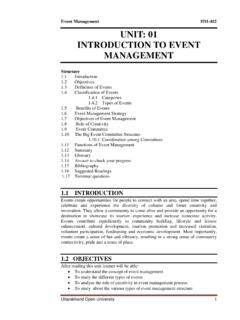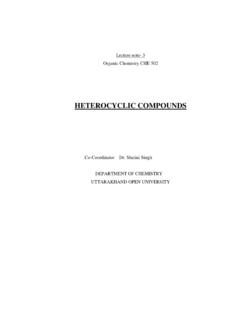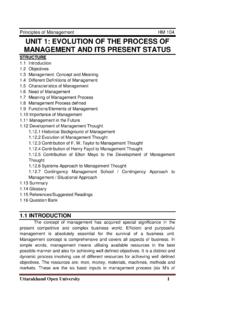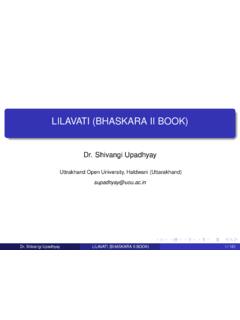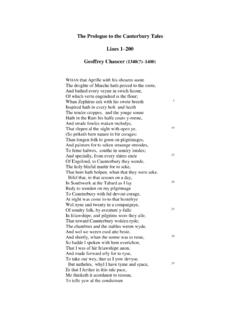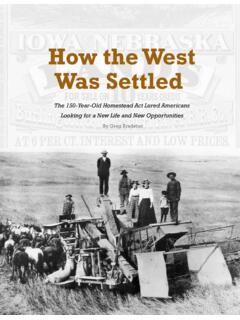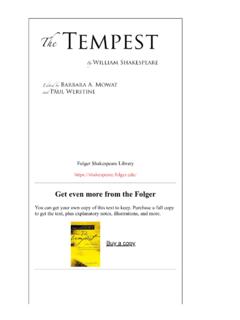Transcription of PROLOGUE TO THE CANTERBURY TALES - Uttarakhand …
1 PROLOGUE TO THE CANTERBURY TALESGEOFFREY CHAUCERS ummary ofThe PROLOGUE One spring day, the Narrator ofThe CANTERBURY Talesrents a room at the Tabard Inn before he recommences his journey to CANTERBURY . That evening, a group of people arrive at the inn, all of whom are also going to CANTERBURY to receive the blessings of "the holy blissful martyr," St. Thomas Becket. Calling themselves "pilgrims" because of their destination, they accept the Narrator into their company. The Narrator describes his newfound travelling more TALES on the journey back. The person who tells the best story will be rewarded with a sumptuous dinner paid for by the other members of the party. The Host decides to accompany the pilgrims to CANTERBURY and serve as the judge of the TALES . The Host at the inn, Harry Bailey, suggests that, to make the trip to CANTERBURY pass more pleasantly, each member of the party tell two TALES on the journey to CANTERBURY and andserve as the judge of the The primary function of these opening lines is to provide a physical setting and the motivation for the CANTERBURY pilgrimage.
2 Chaucer's original plan, to have each pilgrim tell two stories on the way to CANTERBURY and two more on the way back, was never completed; we have TALES only on the way to CANTERBURY . InThe Prologueare portraits of all levels of English life. The order of the portraits is important because it provides a clue as to the social standing of the different occupations. The pilgrims presented first are representative of the highest social rank, with social rank descending with every new pilgrim in the social rank are representatives of the aristocracy or those with pretensions toward nobility. First in this group are the Knight and his household, including the Squire. The second group within those of the highest social standing includes the Prioress, the Monk, and the Friar, who ought to be of the lower class, but who, as a pious beggar, has begged so well that his prosperity ironically slips him into the company of the nobles.
3 Of these pilgrims, probably only the Knight and his son, the Squire, qualify as true aristocrats, both outwardly and inwardly. The "gentilesse" refinement resulting from good breeding of the Prioress and the Monk is largely external and this class are pilgrims whose high social rank is mainly derived from commercial wealth. Included in this group are the Merchant, who illegally made much of his money from selling French coins (a practice that was forbidden in England at the time); the Sergeant of Law, who made his fortune by using his knowledge as a lawyer to buy up foreclosed property for practically nothing; the Clerk, who belongs with this group of pilgrims because of his gentle manners and extensive knowledge of books; and the Franklin, who made enough money to become a country gentleman and is in a position to push for a noble station.
4 (It is evident both from the relationship of the Franklin's portrait to that of the guildsmen, presented next, and from Harry Bailey's scornful remarks to him, however, that he is not yet of the noble class).The next class of pilgrims is the guildsmen, consisting of men who belong to something similar to specialized unions of craftsmen guilds. Among this group of specialized laborersare the Haberdasher, the Dyer, the Carpenter, the Weaver, and the Tapestry-Maker. None of them tell a middle-class group of pilgrims comprises the next lower position of social rank. First presented in this group is the Cook, whom we might consider out of place ranked too high but who, as a master of his trade, is greatly respected by his fellow travelers. Also included in this social class are the Shipman, because of his immense knowledge of and travels throughout the world, and the Physician, a doctor of medicine (a career that was less revered in the Middle Ages than it is now).
5 The Wife of Bath, who is the last of this group to be presented, is included in this group because of her knowledge and deportment and her many other Parson and the Plowmancomprise the next group of pilgrims, the virtuous poor or lower class. Each, although very poor, represents all of the Christian last group of pilgrims include those of the immoral lower class. Among this group of pilgrims are the Manciple, who profits from buying food for the lawyers in the Inns of Court, and the vulgar Miller, who steals from his customers. The Reeve tells dirty stories and cheats his trusting young master, and the corrupt Summonertakes bribes. Last, and most corrupt in this litany of undesirables is the Pardoner, who sells false pardons and fake IN THE PROLOGUE The Narrator-The narrator makes it quite clear that he is also a character in his book.
6 Although he is called Chaucer, we should be wary of accepting his words and opinions as Chaucer s own. In the General PROLOGUE , the narrator presents himself as a gregarious and na ve character. Later on, the Host accuses him of being silent and sullen. Because the narrator writes down his impressions of the pilgrims from memory, whom he does and does not like, and what he chooses and chooses not to remember about the characters, tells us as much about the narrator s own prejudices as it does about the characters Knight-The first pilgrim Chaucer describes in the General PROLOGUE , and the teller of the first tale. The Knight represents the ideal of a medieval Christian man-at-arms. He has participated in no less than fifteen of the great crusades of his era. Brave, experienced, and prudent, the narrator greatly admires Wife Of Bath-Bath is an English town on the Avon River, not the name of this woman s husband.
7 Though she is a seamstress by occupation, she seems to be a professional wife. She has been married five times and had many other affairs in her youth, making her well practiced in the art of love. She presents herself as someone who loves marriage and sex, but, from what we see of her, she also takes pleasure in rich attire, talking, and arguing. She is deaf in one ear and has a gap between her front teeth, which was considered attractive in Chaucer s time. She has traveledon pilgrimages to Jerusalem three times and elsewhere in Europe as Pardoner-Pardoners granted papal indulgences reprieves from penance in exchange for charitable donations to the Church. Many pardoners, including this one, collected profits for themselves. In fact, Chaucer s Pardoner excels in fraud, carrying a bag full of fake relics for example, he claims to have the veil of the Virgin Mary.
8 The Pardoner has long, greasy, yellow hair and is beardless. These characteristics were associated with shiftiness and gender ambiguity in Chaucer s time. The Pardoner also has a gift for singing and preaching whenever he finds himself inside a Miller-Stout and brawny, the Miller has a wart on his nose and a big mouth, both literally and figuratively. He threatens the Host s notion of propriety when he drunkenly insists on telling the second tale. Indeed, the Miller seems to enjoy overturning all conventions: he ruins the Host s carefully planned storytelling order; he rips doors off hinges; and he tells a tale that is somewhat blasphemous, ridiculing religious clerks, scholarly clerks, carpenters, and Prioress-Described as modest and quiet, this Prioress (a nun who is head of her convent) aspires to have exquisite taste.
9 Her table manners are dainty, she knows French (though not the French of the court), she dresses well, and she is charitable and Monk-Most monks of the Middle Ages lived in monasteries according to theRule of Saint Benedict,which demanded that they devote their lives to work and prayer. This Monk cares little for the Rule; his devotion is to hunting and eating. He is large, loud, and well clad in hunting boots and Friar-Roaming priests with no ties to a monastery, friars were a great object of criticism in Chaucer s time. Always ready to befriend young women or rich men who might need his services, the friar actively administers the sacraments in his town, especially those of marriage and confession. However, Chaucer s worldly Friar has taken to accepting Summoner-The Summonerbrings persons accused of violating Church law to ecclesiastical court.
10 This Summoneris a lecherous man whose face is scarred by leprosy. He gets drunk frequently, is irritable, and is not particularly qualified for his position. He spouts the few words of Latin he knows in an attempt to sound Host-The leader of the group, the Host is large, loud, and merry, although he possesses a quick temper. He mediates among the pilgrims and facilitates the flow of the TALES . His title of host may be a pun, suggesting both an innkeeper and the Eucharist, or Holy Parson-The only devout churchman in the company, the Parson lives in poverty, but is rich in holy thoughts and deeds. The pastor of a sizable town, he preaches the Gospel and makes sure to practice what he preaches. He is everything that the Monk, the Friar, and the Pardoner are Squire-The Knight s son and apprentice. The Squire is curly-haired, youthfully handsome, and loves dancing and Clerk-The Clerk is a poor student of philosophy.
